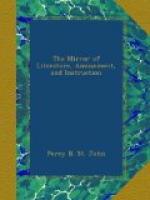DEATH.
Sir Walter’s return to Abbotsford was an afflicting scene. On approaching the mansion he could scarcely be kept from attempting to raise himself in his carriage, such was his eagerness to catch a glimpse of his home: he murmured, on his arrival, “that now he knew he was at Abbotsford.” He lingered for two months, during which he recognised and spoke kindly to friends, and was even pleased in listening to passages read from the poems of Crabbe and Wordsworth: till, on September 21st, 1832, he died, apparently free from pain, and surrounded by his family.
FUNERAL.
His remains were placed in a coffin of lead, enclosed in another coffin covered with black cloth, and gilt ornaments. The inscription plate bore the words, “SIR WALTER SCOTT, of ABBOTSFORD, Bart. AN. AETAT. 62.” The funeral took place at Dryburgh, amidst the ruins of the venerable abbey, at night-fall, on Sept. 25th; the body being borne from the hearse to the grave by his domestics, and followed by upwards of 300 mourners. A Correspondent has furnished us with the subjoined note of the funeral.
It has been remarked that at the grave, the burial service of the Episcopal Church was read by a clergyman of the Church of England (the Rev. John Williams, of Baliol College, Oxford, Rector of the Edinburgh Academy, and Vicar of Lampeter), although Sir Walter through life adhered to the persuasion of the Presbyterian or Church of Scotland. In Scotland no prayers are offered over the dead; when the mourners assemble in the house of the deceased, refreshments are handed round, previous to which a blessing is implored, (as at meals,) and then only the minister alludes to the bereavement the family have suffered, and strength and grace are implored to sustain them under it. This gratuitous custom was adhered to, and previous to the funeral cortege setting out from Abbotsford, the Rev. Principal Baird, offered up a prayer. But although a Presbyterian in practice, Sir Walter in several parts of his works expressed his dissent from several of the rigid canons of that Church, and an example occurs in that graphic scene in the Antiquary, the funeral group of Steenie Mucklebacket, where “the creak of the screw nails announced that the lid of the last mansion of mortality was in the act of being secured above its tenant. The last act which separates us for ever from the mortal relicks of the person we assemble to mourn has usually its effect upon the most indifferent, selfish, and hard-hearted:” and he adds in condemnation, “With a spirit of contradiction which we may be pardoned for esteeming narrow-minded, the fathers of the Scottish Kirk rejected even on this most solemn occasion the form of an address to the Divinity, lest they should be thought to give countenance to the ritual of Rome or of England.” And he seizes the opportunity to applaud the liberal judgment of the present Scottish clergymen who avail themselves of the advantage of offering a prayer, suitable to make an impression on the living.




